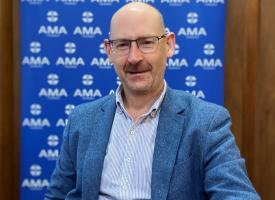Dr Omar Khorshid - Victorian COVID-19 outbreak
Transcript: AMA President, Dr Omar Khorshid, Nine Network, Weekend Today with Richard Wilkins, Sunday, 16 August 2020
Subject: Victorian COVID-19 outbreak
RICHARD WILKINS: Well, there is more in Victoria's fight this morning after the State recorded 303 new infections, down from the previous total of 372. But there is. of course, growing concern over another 264 mystery cases still under investigation. Recently-appointed AMA President Dr Omar Khorshid joins us now from Perth. Thank you for joining us.
There's now a total of 3383 mystery cases in Victoria. That is the alarming statistic, isn't it? How concerned are you by that figure?
OMAR KHORSHID: Well, we know with this virus that you can have it and just not know it, and that's why the restrictions that have been put in place, the lockdown, is so important because it doesn't rely on people knowing they've got the virus, it just separates everyone, and it reduces the chance of it being spread through the community. And we're seeing the numbers come down - not hugely yet - but we're hoping that another week or so, we'll really start to see those numbers plummet as less and less Victorians are catching the virus and not knowing about it.
RICHARD WILKINS: These contact tracers do an incredible job. Are they doing enough, and are there enough of them?
OMAR KHORSHID: There's just too many people with the virus for the contact tracers to be able to keep up, and we saw that very early on. And I think most people would accept that if more contact tracing had been done early, then maybe this situation wouldn't have happened. But once you get hundreds and hundreds of cases a day, you've then got to find 10 to 20 to 50 to 100 people per case. It's just impossible for contact tracers, and it's why it's so important that the general lockdowns are in place. And also, I guess, that we've got as many Australians as possible who've downloaded the COVIDSafe app.
RICHARD WILKINS: So, at what point do the contact tracers just go: there's too many, we can't do them all - or what's happening now?
OMAR KHORSHID: Well, that's why the lockdowns are in place. Contact tracing will still help prevent more outbreaks in particular places, like aged care or workplaces where we know that many people are getting infected. But, at the end of the day, when you've got so many people and when you've got so many cases that have not even been tested yet, it is a simply impossible job for contact tracers.
RICHARD WILKINS: Is the COVID-19 app helping at all?
OMAR KHORSHID: The app has actually been helping from what we understand, and there have been some modifications to the app to make it more useful for contact tracers. So, the really strong message now is for every Australian who’s got a smartphone to get that app and make sure it's actually loaded and running on your phone, and it will help contact tracers do their job.
RICHARD WILKINS: I don't know why you wouldn't do that. Despite these mystery cases, Victoria's Chief Health Officer is confident that we've seen the peak. Do you agree with that?
OMAR KHORSHID: As long as the restrictions remain in place and Victorians keep doing the right thing, as they have been for the last week or almost two weeks now, we will see the numbers continue to drop. What we've really got to aim for, though, is no community transmission, and that does seem a fair way away yet.
RICHARD WILKINS: Yeah. A large proportion of these cases are cropping up in aged care, our most frail and vulnerable. Is that to be expected?
OMAR KHORSHID: Look, it was seen with the start of the pandemic in Sydney. We had some terrible situations with a couple of outbreaks in Sydney, and there was, I guess, a wake-up call for the rest of Australia that unfortunately wasn't adequately heeded. And we've seen tragic scenes in Victoria with hundreds of nursing homes being affected and we've now seen hundreds of deaths of elderly Australians as a result of the sector just not being ready.
I think, though, the message has now been heard. We've heard worrying stories at the Royal Commission. and I think Government has heard the message, and we're now seeing better coordinated action to make sure that aged care is protected. And if an outbreak does happen in aged care, that there's a rapid response from the health authorities.
RICHARD WILKINS: Yeah, these poor elderly people. So finally, how close are we going to need to get to zero before lockdown ends?
OMAR KHORSHID: Well, you've got to get very close to zero, because we've seen in Victoria that it only took a case or two to end up in this disaster, so you've really actually got to get community transmission completely resolved. You've got to get all the people who've got the virus and who don't show it, you've got to get them better.
And we've got to get the health system and the quarantine system, the aged care system back to its normal state before it'll be possible to relax the restrictions. And I suspect, like we saw the first time around, they'll actually slowly come off over a period of weeks and months rather than a rapid return to normal.
RICHARD WILKINS: Still a fair way to go. We appreciate you getting up early for us in Perth this morning, so thank you for your time. Cheers.
16 August 2020
CONTACT: Maria Hawthorne 02 6270 5478 / 0427 209 753
Follow the AMA Media on Twitter: http://twitter.com/ama_media
Follow the AMA President on Twitter: http://twitter.com/amapresident
Like the AMA on Facebook https://www.facebook.com/AustralianMedicalAssociation



